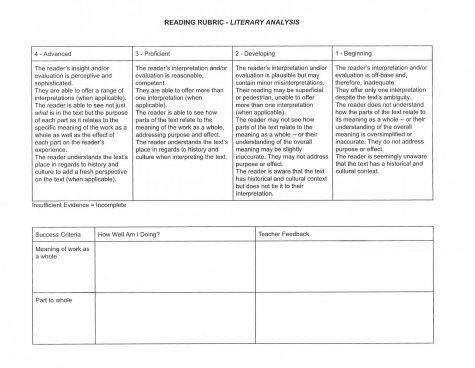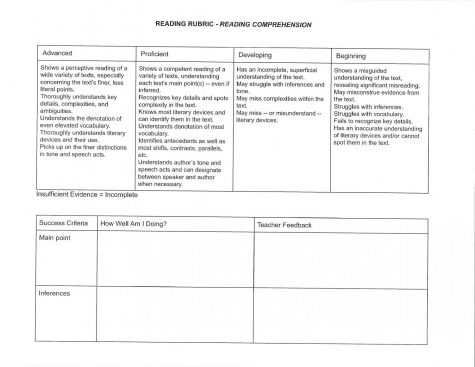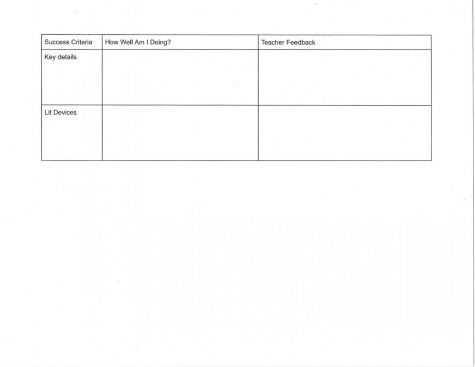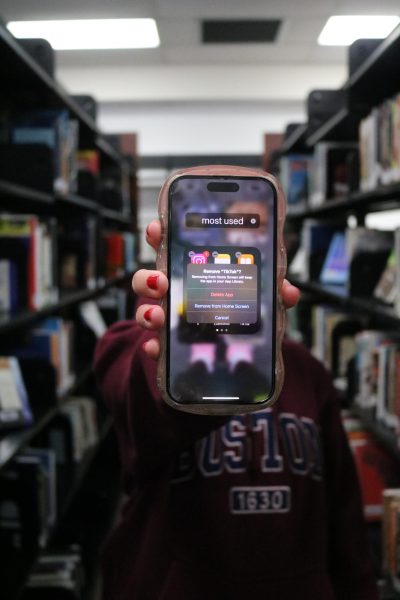Striving towards standards






 In several classrooms at LHS, percentages are on the way out and standards-based grading is on its way in. Certain teachers in several different departments have introduced this new grading system into their classes this year.
In several classrooms at LHS, percentages are on the way out and standards-based grading is on its way in. Certain teachers in several different departments have introduced this new grading system into their classes this year.
Multiple English teachers who are using standards-based grading (SBG) at LHS agree that the overall idea of this type of grading is to give students more feedback so that they can truly better their skills rather than solely focus on a certain number of points or a percentage grade. Mrs. Anne Singleton describes SBG as an innovative way to foster more engaged students as well as a positive atmosphere in the classroom.
In the SBG system, students work to reach different levels of achievement, sometimes defined as Advanced, Proficient, Developing and Beginning. The goal is for the system to facilitate more improvement in students’ skills throughout the school year so they can move from a lower level, such as Beginning, to a higher level, such as Proficient or Advanced, in one or more of the course’s standards, suggests Dr. Paul Reiff, the English department supervisor.
SBG has also been implemented in some foreign language, math and science classes. The English department has largely invested in this new program as well.
Dr. Reiff said that “what’s driving [teachers] and motivating them isn’t [me] telling them ‘do this.’ They are trying to find a more meaningful way, a better way, to grade and provide kids with feedback.”
“The conversation between teachers and students shifts from ‘How many points do I need?’ to ‘What is it that you need me to show?’” explained Dr. Reiff.
Standards-based learning attempts to end this points game and rather focuses on the mastery of skills.
When Dr. Reiff introduced the SBG idea to his English team, many of them jumped at this system and wanted to implement it into their classes this year, which was earlier than Dr. Reiff had expected. The majority of the world literature team decided to take on this time-intensive change, as well as some other teachers in the English department.
Many of these teachers went to a workshop taught by LHS teacher Mrs. Christee Joesten, who has been using SBG in her precalculus classes. A team of English teachers went to Stevenson High School as well, where standards-based grading is practiced. Some of the English teachers, such as Mrs. Singleton, even went to a conference in Minnesota to learn from Tom Schimmer, who wrote the book “Grading From the Inside Out.”
The English teachers exploring SBG then read Schimmer’s book and other texts to better understand how to successfully use this novel type of learning in their classrooms. Mrs. Singleton said that she and the world literature team spent more than 30 hours during the summer in preparation for SBG to be used in their classes this school year.
After implementing the new grading system into her classes, Mrs. Singleton “noticed a real sense of pride when those students get their rubrics back and they see improvement.”
She also explained that students have more freedom to choose what they need to work on and notices that students, especially seniors in her College Prep Writing class, appreciate this.
“We came to the conclusion that it was time to try something different. I felt like my students were more concerned about points and not concerned about improving as readers and writers. And that was a real concern for me,” stated Mrs. Singleton.
English teacher Mr. Matt Tooley, who is also using SBG in his classroom, expressed that “One of the big problems we’ve seen [in the past] is students focusing on the grade more than the actual learning.”
Added Dr. Reiff, who has implemented SBG in his classes this year: “We want to grade and report in a way that’s more meaningful to students and isn’t just the pursuit of points.”
These teachers are on board to take on this innovative grading system as they attempt to better their students’ understanding of the skills being taught. This excitement is mirrored in some of their students, but not all of them.
Senior Christine Perritano appreciates the new standards-based grading system. Perritano, who is taking AP English Literature with Mr. Ryan Ebling, a class using SBG, talked about how in the past, English classes had been difficult because she felt there were strict rubrics that regulated writing to one style, where a student either got it or they didn’t. She expressed that this year, SBG allows more freedom because Mr. Ebling has helped her to understand different skills within the curriculum.
“Instead of being graded strictly on, let’s say multiple choice, we are graded on how we read multiple choice, so we are graded on reading instead of just answering strict questions,” she said, adding that she appreciates how SBG focuses on students’ progress as well.
On the other hand, teachers and students have talked about their frustration with implementing standards-based grading into a larger grading system that still requires letter grades to be reported.
“I think it’s hard when, at the end of the day, we still have to get a grade. It was translated, so when I look at my transcript, I see the ‘A,’” said senior Olivia Cherry, another AP English Literature student. “It kinda takes away from the whole semester of ‘grades don’t matter, grades don’t matter, grades don’t matter,’ and then we ended up with a grade.”
In many classes that use SBG, homework is not counted in the gradebook . While Cherry appreciated the practice of writing many essays, she also felt more pressure from these because the essays that counted towards her grade had a very large impact.
She believes that there should be a mix of homework and tests in the gradebook because “people who don’t perform well under pressure won’t get a grade boost from actually trying and doing all of their work [outside of assessments].”
While implementing a new grading practice at LHS has been challenging, many stakeholders continue to believe that SBG is significant and defensible. Dr Reiff, being one of them, exclaimed that “[SBG] is just continuing the conversation of, how can we do [grading and reporting] better? How can we do it different? How can we do it more effectively?”



![Mr. Abullh Ali, manager/assistant, helps open Queen Yemeni Coffee in downtown Libertyville at 606 North Milwaukee Ave. With the help of employees such as manager and LHS senior Yousef Taha, they are able to bring the Yemeni and Ethiopian culture to Libertyville by using their Queen spices, cinnamon and cardamom in their drinks such as Adani Chai, which is inspired by Sheda, the Queen of Yemen and Ethiopia. “The history of our coffee [is] a long history and we believe that Yemen and Ethiopia started the coffee and we are bringing something unique to the community,” Mr. Ali said.](https://www.lhsdoi.com/wp-content/uploads/2025/04/Photo-1-600x400.jpg)



